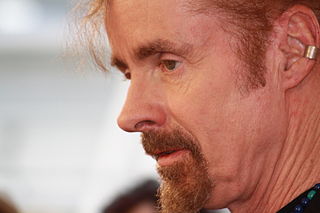A Quote by T. C. Boyle
I'm just kind of fascinated by how we can deny that we are animals and what our impact on the other animals is like, and how quixotic we can be in trying to assess what we've done in trying to correct it.
Related Quotes
Humans and other animals experience love and fear, and form deep emotional bonds with cherished companions. We mourn when a close friend dies, and so do other animals, as Barbara King's poignant book illustrates in compelling detail. How Animals Grieve helps us to connect and to better understand the complex social lives of other animals and of ourselves.
The stress that we [with Abilities] always feel is trying to continue advancing with our music. That's our plight, it's ingrained in our personalities. We feel like we're trying to race the world of music itself - just trying to create the best music, and as soon as we get done with one piece we're trying to figure out how to top it.
What the meat industry figured out is that you don't need healthy animals to make a profit. Sick animals are more profitable... Factory farms calculate how close to death they can keep animals without killing them. That's the business model. How quickly they can be made to grow, how tightly they can be packed, how much or how little can they eat, how sick they can get without dying...We live in a world in which it's conventional to treat an animal like a block of wood.
The world of organisms, of animals and plants, is built up of individuals. I like to think, then, of natural history as the study of life at the level of the individual-of what plants and animals do, how they react to each other and their environment, how they are organized into larger groupings like populations and communities.
Humans — who enslave, castrate, experiment on, and fillet other animals — have had an understandable penchant for pretending animals do not feel pain. A sharp distinction between humans and 'animals' is essential if we are to bend them to our will, make them work for us, wear them, eat them — without any disquieting tinges of guilt or regret. It is unseemly of us, who often behave so unfeelingly toward other animals, to contend that only humans can suffer. The behavior of other animals renders such pretensions specious. They are just too much like us.
Conversation with animals could happen, but I think it would be easier for it to happen with creatures we share a bit more with - those that have been bred to interact with us, like dogs or horses, or ones to whom we have a natural evolutionary link, like chimps and other nonhuman apes. I mean, we do communicate with dolphins and whales, but we're not trying to get to the depths of their understandings. I feel that with animals as different from us as the whales and dolphins, it's likely to work better with us just watching them and trying to figure them out.
Typically, defenders of experiments on animals do not deny that animals suffer. They cannot deny the animals' suffering, because they need to stress the similarities between humans and other animals in order to claim that their experiments may have some relevance for human purposes. The experimenter who forces rats to choose between starvation and electric shock to see if they develop ulcers (which they do) does so because the rat has a nervous system very similar to a human being's, and presumably feels an electric shock in a similar way.
I wish people were more like animals. Animals don't try to change you or make you fit in. They just enjoy the pleasure of your company. Animals aren't conditional about friendships. Animals like you just the way you are. They listen to your problems, they comfort you when you're sad, and all they ask in return is a little kindness.
It has been well said that the food one consumes determines one's thoughts. By eating the flesh of various animals, the qualities of these animals are imbibed. How sinful is it to feed on animals, which are sustained by the same five elements as human beings! This leads to demonic tendencies, besides committing the sin of inflicting cruelty on animals.







































